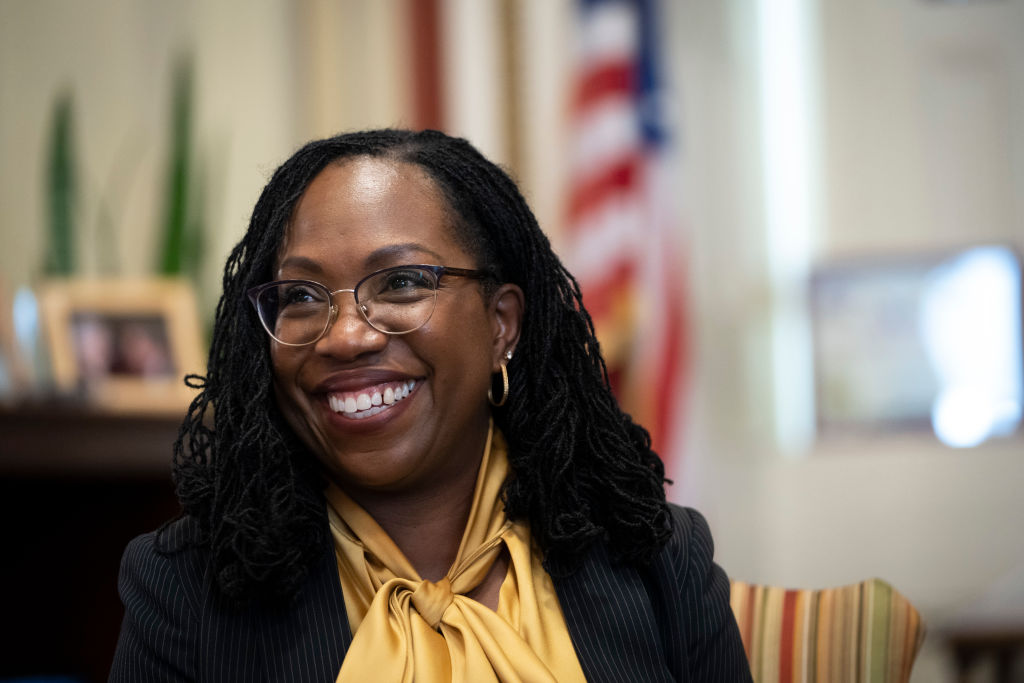Biden, Jackson and the meaning of a Supreme Court pick
With the State of the Union out of the way, the confirmation process for Biden’s Supreme Court pick Ketanji Brown Jackson has begun in earnest. Biden’s pick — and his previous promise to select a black woman to fill a vacancy on the court were one to arise — have kicked off a lively conversation about the court’s composition.
In the March issue of the magazine, legal scholar Benjamin H. Barton made the case for “real diversity” on the Court. Barton’s article happened to land at Spectator HQ before Justice Stephen Breyer announced his retirement, but that development would give fresh salience to the questions with which he grapples.
I admit feeling a slightly amused detachment when it comes to the debate over Biden making good on his promise to select a black woman to fill a vacancy on the court were one to arise during his presidency. The amusement derives, first and foremost, from the gap between the grand principles invoked on both sides of the conversation and the circumstances in which Biden made his pledge.
The president’s promise came at a decisive moment in the primaries during a debate in South Carolina. Jim Clyburn, the kingmaker congressman from Palmetto State, squeezed the commitment out of a Biden desperate for his endorsement backstage during a commercial break. The then-candidate announced the promise in his next answer in the debate, hearing what he needed to hear, Clyburn went public with his all-important endorsement. The rest is history.
That backstory is a reminder that Supreme Court picks are entirely political matters. It is an entertainingly transactional rejoinder to the highfalutin and morally serious arguments invoked by the president’s defenders.
On the other side of the debate, arguments against positive discrimination are well and good, but those making them rarely acknowledge that selecting a Supreme Court justice and deciding who gets to go to Harvard Law are different matters entirely. To miss that is either naive or cynical. Yes, presidents want to choose someone who is up to the job, but too often the debate around filling a court vacancy takes on the tone of a McKinsey partner interviewing new recruits, as though sheer intellectual might is the only valid criteria for selection.
In his Spectator piece, Barton makes a conservative case for a court that reflects the country. He explains the Court’s current composition, heavily weighted as it is to the Ivy League, the Acela corridor and a narrow idea of what makes for an appropriate legal training for the job, is a historical anomaly:
Justices have lived and practiced all over the country. They’ve fought in wars. They’ve served at the highest levels of the government to some of the lowest, from village postmaster to Postmaster General. They’ve been police court judges and state Supreme Court justices. They were senators, congressmen, a former president. And a school-board member. Let’s bring back a Court that reflects American greatness in all its bizarre variation: geographic, economic, experiential.
Judged according to Barton’s criteria, Jackson wins experiential points. She is the first former public defender to be nominated to the Supreme Court. And, yes, being a black woman counts for something too. But she would lose points for being yet another Ivy League graduate (Harvard).
The point is not the verdict, though. It is merely that the left and right have their own versions of diversity. Indeed, the RNC’s dossier on Jackson includes the charge that she is “a member of the Cosmos Club, a private DC club of the Washington elite.” Hardly the most stinging attack, but an admission of something everyone knows: that the composition of the Supreme Court is not simply a matter of competence or ideology.
*** Sign up to receive the DC Diary in your inbox on weekdays ***
A low-key confirmation on the cards
When it comes to the confirmation itself, all signs point to a relatively low-key process. That is a dangerous thing to predict in Washington today, and there will of course be the usual grandstanding and feigned outrage. Yes, we will have a modern-day vote on near-party lines, but Biden’s pick — and the circumstances — offer little opportunity for a blockbuster showdown. GOP attacks on Jackson as a far-right choice must overcome a predictably left-liberal track record, and one or two surprising stances. Jackson herself seems low-key, whip-smart and sensible, and not someone easily painted as a dangerous radical. When Jackson spoke at the White House last week she thanked God “for delivering me to this point in my professional journey” and praised America as “greatest beacon of hope and democracy the world has ever known.”
After meeting Jackson yesterday, Mitch McConnell said there was no question she was qualified and added: “I think she’s intelligent, very likely progressive. [The] Senate Republican minority intends to treat the nominee respectfully. I’m not at all interested, for example, in what someone may have written in her high school yearbook.”
Some of McConnell’s colleagues will take a more combative approach. But America is swapping one liberal justice for another, doing so a long way away from a presidential election and against a backdrop of grave events in Europe. For these reasons, don’t expect the battle over Jackson’s nomination to live long in the collective memory.
Ducey disappoints
Arizona governor Doug Ducey has decided against a Senate run. “I have the job I want,” he said in a letter to donors obtained by the Arizona Republic. The development is a blow for the Republican establishment. Mitch McConnell had been desperate for Ducey to enter the Republican primary to decide who will square off against Mark Kelly in a competitive Senate race later this year.
What you should be reading today
Grayson Quay: The Russian Orthodox Church eyes Ukraine
Peter W. Wood: Is Europe a continent? Does it matter?
Gilbert T. Sewall: Putin understands America’s moral decay
John Dickerson, the Atlantic: What Joe Biden can learn from Harry Truman
Emanuele Ottolenghi, Tablet: Accommodating Iran will be no more successful than accommodating Russia
Andrea Kendall-Taylor and Erica Frantz, Foreign Affairs: The beginning of the end for Putin?
Poll watch
President Biden Job Approval
Approve: 40.7 percent
Disapprove: 54.3 percent
Net approval: -13.6 (RCP Average)
Florida Senate seat
Marco Rubio (R): 49 percent
Val Demings (D): 41 percent (USA Today/Suffolk)


















